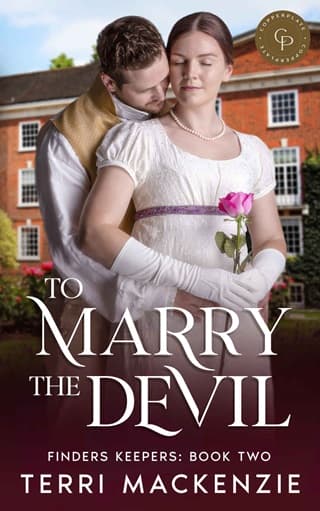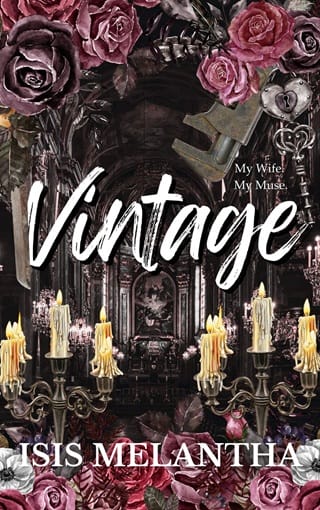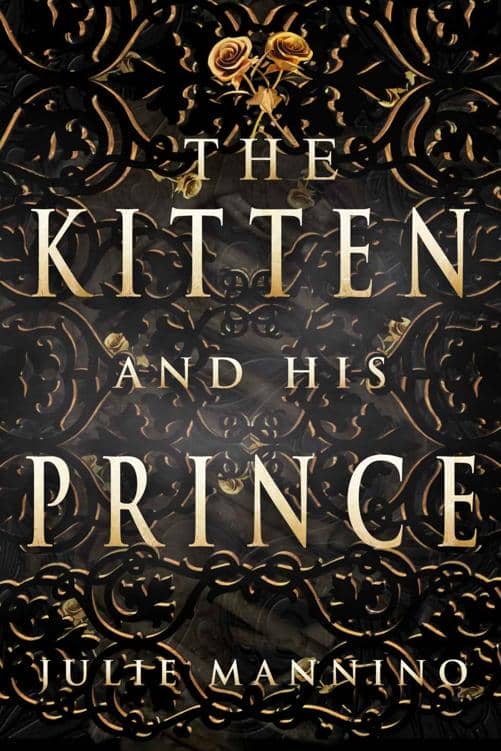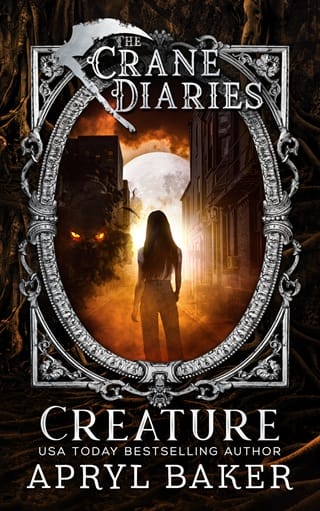Chapter Seventeen
It was with great reluctance that Jacob moved into his brother's house. Long ago, it had been his father's, too, and as he walked through the empty rooms, furniture swathed in white sheets, the ghosts of memory tickled his senses. The library was large and spacious, filled with books that had been collected over generations.
The scars across his back throbbed with memory. In front of the fireplace, his father had beaten him with a poker.
The drawing room was a little dated now, last decorated at the turn of the century. Here, on the sofa, Cecil had stabbed him with his quill so hard the injury bled for three hours. He rubbed the scar on his arm unconsciously.
Of course, Cecil had apologised, penitent yet somehow still righteous. He had only behaved that way because of Jacob; if Jacob hadn't been so difficult, Cecil would never have hurt him.
The wound had hurt, but not as much as the memory did.
As an adult, Cecil would never have done such a thing—but as an adult, Cecil's crimes had been different and far worse. Jacob would have endured any amount of physical injury if Cecil had just done the right thing by Madeline. Maybe then, she would still have been alive.
If Jacob had his way, he would burn this place to the ground, memories and all. That would best match his intentions of destroying his family's reputation once and for all. What better revenge than burning down the very house his father had so adored? Generations of Barringtons up in smoke.
But the idea no longer held the appeal it once had. If he destroyed all his inheritance, he would be penniless, forced to endure on the fringes of Society, left with no money to his name. Or worse, he would be arrested, though he wasn't sure it counted as a crime if it were his own property.
Perhaps he should consult his lawyer.
Then again, he could take a look at what would need to be done to maintain the estate. Perhaps he could sell this house and purchase another. Far less destructive. And would a quiet life really be so bad? Once, he had thought it would be the worst kind of hell, but recently . . .
Like clockwork, he thought of Annabelle. The wistful look in her eyes when she said she would have preferred Cecil.
Her and everyone else.
Even dead, his brother was preferable.
He should not have yielded to the ridiculous urge to match up to his brother this morning. Annabelle's opinion of him would not be swayed by one small gift, and nor should it be. Once the summer ended, they would go their different ways and this part of his life would be over. And good riddance.
Gritting his teeth, he squashed the lingering hurt and strode into the study. Cecil's study; his father's study. The room smelt faintly of cigar smoke, and even though Cecil had sat here for the past ten years, Jacob could still imagine his father behind the desk, examining the results of his profligacy. Even now, bills awaited him, piling high on the desk. Bills and letters from his man of business, letters from his steward, invitations for Cecil that had continued to pour in the week or two after his death before news of it reached every household in London. Those were the first to go; Jacob did not even glance at them as he tossed them into the empty hearth. Then he rang the bellpull.
"My lord?" The butler, Smythe, was as austere and disapproving as always. No doubt Jacob would receive his letter of resignation soon enough now he had officially moved into the house.
"I want all this moved," Jacob said, nodding to the stack of papers. He considered asking for a scotch, but something stopped him. "Take it to the small parlour."
"Sir?"
"I'll have it converted into a new study. I will work in there."
Smythe's grey eyebrows rose in surprise. "You're intending to see to the post, my lord?"
"Yes, Smythe." Jacob fixed his butler with an icy glare. "Do you have a problem with that?"
Smythe gave a stiff, unwilling bow. "Not at all, sir."
"Then arrange to have this moved and have done with it."
"Very good, sir." With one last disapproving sweep of the room, Smythe took his leave, no doubt to fetch the footmen. Jacob left immediately, preferring to escape the cigar smoke and the residual panic that still flared at the scent.
Twenty-six and haunted by a smell. It was pathetic.
While all the paperwork was moved, he took a short lunch and did not once allow his thoughts to stray towards Annabelle.
Norfolk House was a flurry of activity. Annabelle's mother had sent a note that Henry had finally returned from France, and Theo immediately arranged for them to visit, intending to summon the carriage. Ordinarily, they would have walked, but she was feeling a trifle under the weather.
After ensuring her sister was well enough for the journey, Annabelle lapsed into silence as they waited in the hall for Nathanial. Her morning dress was a shade of pale blue that brought out the colour of her eyes, and she had worn it in the vague, unarticulated hope she would see Jacob that morning.
Instead, she was due to see her brother. Nerves twisted at the thought.
"A delivery for you, my lady," the butler said, cutting into her confusion.
"More jewellery?" she asked tiredly. Of all the gifts she could receive, jewels were her least favourite. She didn't care to wear them and they were usually ostentatious; a demonstration to the world of his affection, not a demonstration to her.
Which, of course, was the purpose of the gifts. But every time she opened another box to reveal rubies, sapphires, diamond-studded bracelets or huge, teardrop earrings, she felt her heart sink a little further.
The butler smiled at her. "Not this time, my lady," he said, handing her a small, rectangular package. There was a note attached, and she opened it with eager fingers.
Little bird,
I have never been an avid reader, but this was always a favourite of mine.
Yours,
Jacob
Her eyes stung as she ripped open the brown paper to reveal a bound collection of Shakespeare's sonnets. Not new—she suspected it had been read a number of times, and if his note was to be believed, by Jacob himself.
She opened the little book, letting it fall naturally to the page that had been read most.
Sonnet 116
Let me not to the marriage of true minds
Admit impediments; love is not love
Which alters when it alteration finds,
Or bends with the remover to remove.
O no, it is an ever-fixed mark
That looks on tempests and is never shaken;
It is the star to every wandering bark,
Whose worth's unknown, although his height be taken.
Love's not Time's fool, though rosy lips and cheeks
Within his bending sickle's compass come;
Love alters not with his brief hours and weeks,
But bears it out even to the edge of doom.
If this be error and upon me proved,
I never writ, nor no man ever loved.
"He sent you a book?" Theo asked, rousing herself as Annabelle read the sonnet again and again, drinking in the words like sweet, addictive punch. "Well, I suppose he must like you after all."
He had been reading sonnets about love. Jacob had read about love. Irreverent, careless, mocking Jacob had read poetry.
Then she remembered what he had said about his family at the ball. Because I despise my family and everything they stand for.
Suddenly, these words of love took on a different context. She pictured him now as a young boy, reading about love being an ever-fixed mark, that looks on tempests and is never shaken. If he had a loveless upbringing . . .
This gift felt like the most precious thing she owned.
"Are you all right?" Theo asked, squinting at her.
Annabelle cleared her throat, handing the book back to the butler. "Jarvis, can you have this taken to my bedchamber, please?"
"Of course, my lady." Jarvis left, as stiff-backed as always, and Annabelle brushed her hair back from her face, trying to push back the emotions swarming her. For an odd reason, Jacob's gift made her want to cry.
"Who would have thought the Devil of St James enjoyed poetry," Theo mused with a grin that almost matched her usual aplomb.
To Annabelle's relief, Nathanial finally descended the stairs, providing a much-needed distraction, and Annabelle was free to dwell on Jacob's gift in relative peace.
What did it mean? Was it a peace offering of sorts? They had not argued, but he had certainly left her looking . . . angry. Hurt, perhaps, although the possibility that she could ever have said anything to hurt him seemed ludicrous in the extreme. The Devil of St James was not capable of being hurt.
But he had sent her poetry. And not only that, but Shakespeare. Sonnets. How was this the same man who had cornered her in a library and kissed her so thoroughly, or after kissing her in a closet, told her she had taken the edge off? No matter how she tried to explain the reason behind the sonnets, she could not stop the flutter in her stomach at the thought.
After she had thought she had hurt him, he had sent her sonnets.
The carriage pulled up at her parents' house and there was abruptly no more time for reflection. Servants scurried past them with bags and paintings and everything needed to settle the heir back in his own room, and the sense of urgency sent her anxiety spiking once again.
Henry was here. And he was going to learn, if he did not already know, of her engagement to Jacob—and the circumstances behind that engagement, which felt more shameful. She knew nothing had occurred in the garden, but something had occurred in the library.
Something more had occurred in the closet. It was a memory she did her best not to dwell on, because it made her think about other things he could do for her. Perhaps the act she had read about.
Never had the prospect of ruining herself felt so appealing.
But he had shown no signs of wanting to continue what they had started, and that was for the best. At least, that was what she continued to tell herself. If she was going to marry another man, she could not afford to involve herself with the Marquess, no matter how much she thought she might want to.
"The Duke and Duchess of Norfolk," the butler announced as they reached the drawing room. "And Lady Annabelle Beaumont."
The moment they entered, Annabelle saw her brother, sitting with his mother as though no time had passed. He looked older and grimmer than she could remember. The seven years he had been absent had not been kind to him.
Her mother jumped to her feet and held out her hands. "My dears, you're here! Finally! Look who it is."
"Told you she had a favourite," Theo muttered in Annabelle's ear, and Annabelle stifled a laugh as Henry also rose, the worn expression on his face smoothing into a genuine smile.
"Theo," he said "Anna. You've both grown so much since I last saw you."
"Well I am married now," Theo said, and Nathanial grinned, holding out his hand.
"You'll probably thank me for taking her off your hands."
"I can't tell you how relieved I am," Henry said, winking at Theo, who stuck her tongue out at them both.
As always in large gatherings, Annabelle was sidelined. Her personality wasn't large enough to compete with the others', and she found she didn't particularly want to. Overt displays of emotion and affection weren't something she was especially comfortable with either receiving or expressing, and having everyone fawn over her was something she had never liked.
Henry broke past Theo and stood before Annabelle. "Anna," he said, his voice warm. She raised her gaze hesitantly to his face. The war had changed him. The young man she remembered had turned into a grim-faced man of thirty, with crow's feet spreading from the corners of his blue eyes that held shadows she had not noticed in the past.
"How you've grown," he said, still in that affectionate voice.
"I'm almost twenty now," she reminded him.
"Yes, I haven't forgotten."
"And she's engaged," their mother said, hurrying to take part in the conversation. She placed a hand on Henry's arm, looking up at him adoringly. Annabelle's father had been such a disappointment to the whole family, it was hardly surprising that their mother now looked to her eldest son to save them.
Henry blinked at Annabelle in surprise. "Engaged?"
Annabelle wished everyone had kept her business a secret. With Henry back in Town, it would be even harder to extricate herself from this faux engagement when the time came.
"To Lord Sunderland," Theo supplied. "Or Lord Jacob Barrington as you would have known him then."
Henry's jaw snapped shut, muscles flexing, and his eyes darkened. "Jacob Barrington?"
"He's the Marquess now," their mother said, giving Annabelle a rare approving look, as though she had been responsible for the prior Marquess's death. As though that was a good thing.
Annabelle felt vaguely ill.
"What in the seven hells do you think you're doing marrying Barrington?" Henry demanded. All the joviality that had been on his face previously had dissolved into anger Annabelle didn't understand. There was something hard there, cultivated by the war no doubt, that was as sharp as a diamond-edged blade.
"With all due respect," Annabelle said calmly, her heart pounding in her chest, "it's not your business who I marry and who I don't."
Henry turned to their mother. "Does Father know about this?"
"Of course he does," she said, confusion blooming. "And he has given his permission."
"Of all the men in the world, Anna," Henry snapped, "you had to choose a man who would mistake honour for licentiousness?"
Annabelle thought of the book of sonnets he had gifted her with that very morning. "With all due respect," she repeated, her fingers clenching with impotent anger, "you don't know him."
"Oh, I know him well enough," he said darkly. "And I know the kinds of things he's done."
"Well—"
"Did you know he ruined his brother's betrothed?" Henry demanded. "They were all set to marry before Barrington seduced her so thoroughly, her own father cast her out."
Annabelle went cold. No, she did not know that—all she knew was that the two brothers had not got along, but she had assumed that was because of brotherly bad blood, not because Jacob had . . .
Hadhe?
Yes, she could well believe it. Her lips parted, ready to defend him, but she had no voice. There was no defence for a crime like that.
"Beaumont," Nathanial said, his tone cutting. "A word outside, if you please."
Henry gave her a disgusted look and left the room with Nathanial, and Annabelle tried to control her racing thoughts as she sank down onto the sofa. Theo took her hand, squeezing it.
"Whatever mistakes he made in the past, he is not making them now. Unless you were in the garden being seduced," she added dryly. "And even then, he is marrying you."
"He never mentioned anything about this," she said, her lips numb. "And no, Theo, he did not seduce me in the garden." In fact, he had gone out of his way to prevent her seduction, even though there had been a moment when she had thought she would not have minded.
And she had thought he would not have minded, either.
But to seduce his own brother's betrothed and ruin her utterly?
"Henry should have known better than to spring this on you like this," Theo said, rubbing her hand. "It's an old scandal. Before either of our times. Do you really care for him so much, Anna?"
Annabelle shook her head, though she was not entirely sure it was the truth. At their engagement ball, she had told Jacob she would have married his brother.
I assure you, you would not be the first.
How much had she hurt him? What would he do to assuage that hurt?
Surely Henry could not have been correct.
She felt positively ill.
"Let's return home," Theo said bracingly, squeezing her hand. "Nate can find his own way home after he's finished berating Henry." Her expression darkened, but Annabelle couldn't help but notice her lips looked a little too pale. "I don't know what he was thinking."
Her mother sat on Annabelle's other side. "He was just trying to look out for you, dear," she said placatingly. "I'm sure he'll come around and see sense."
"Mama," Theo said sharply. "Henry was out of line. You can't defend him."
Their mother fell silent, and Annabelle rose on shaky legs. "Yes," she said, formulating a plan as she spoke. She needed to see Jacob—now. "Let's return home."
 Fullepub
Fullepub 



